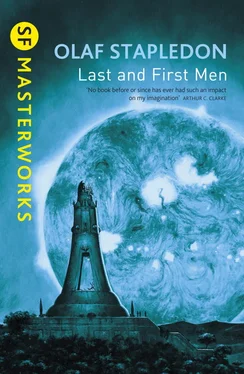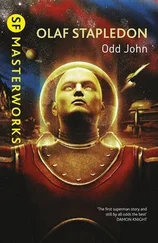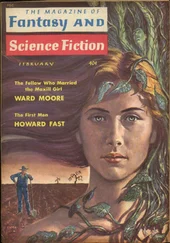Olaf Stapledon - Last and First Men
Здесь есть возможность читать онлайн «Olaf Stapledon - Last and First Men» весь текст электронной книги совершенно бесплатно (целиком полную версию без сокращений). В некоторых случаях можно слушать аудио, скачать через торрент в формате fb2 и присутствует краткое содержание. Город: London, Год выпуска: 1999, ISBN: 1999, Издательство: Orion Publishing Group, Жанр: Фантастика и фэнтези, на английском языке. Описание произведения, (предисловие) а так же отзывы посетителей доступны на портале библиотеки ЛибКат.
- Название:Last and First Men
- Автор:
- Издательство:Orion Publishing Group
- Жанр:
- Год:1999
- Город:London
- ISBN:978-1-857-98806-2
- Рейтинг книги:3 / 5. Голосов: 1
-
Избранное:Добавить в избранное
- Отзывы:
-
Ваша оценка:
- 60
- 1
- 2
- 3
- 4
- 5
Last and First Men: краткое содержание, описание и аннотация
Предлагаем к чтению аннотацию, описание, краткое содержание или предисловие (зависит от того, что написал сам автор книги «Last and First Men»). Если вы не нашли необходимую информацию о книге — напишите в комментариях, мы постараемся отыскать её.
is full of pioneering speculations about evolution, terraforming, genetic engineering and many other subjects.
Last and First Men — читать онлайн бесплатно полную книгу (весь текст) целиком
Ниже представлен текст книги, разбитый по страницам. Система сохранения места последней прочитанной страницы, позволяет с удобством читать онлайн бесплатно книгу «Last and First Men», без необходимости каждый раз заново искать на чём Вы остановились. Поставьте закладку, и сможете в любой момент перейти на страницу, на которой закончили чтение.
Интервал:
Закладка:
In Asia and Africa, some semblance of order was maintained for a while. Presently, however, the American Madness spread to these continents also, and very soon all living traces of their civilization vanished.
Only in the most natural fertile areas of the world could the diseased remnant of a population now scrape a living from the soil. Elsewhere, utter desolation. With easy strides the jungle came hack into its own.
CHAPTER V - THE FALL OF THE FIRST MEN
1. THE FIRST DARK AGE
WE have reached a period in man’s history rather less than five thousand years after the life of Newton. In this chapter we must cover about one hundred and fifteen thousand years, and in the next chapter another ten million years. That will bring us to a point as remotely future from the First World State as the earliest anthropoids were remotely past. During the first tenth of the first million years after the fall of the World State, during a hundred thousand years, man remained in complete eclipse. Not till the close of this span, which we will call the First Dark Age, did he struggle once more from savagery through barbarism into civilization and then his renaissance was relatively brief. From its earliest beginnings to its end, it covered only fifteen thousand years; and in its final agony the planet was so seriously damaged that mind lay henceforth in deep slumber for ten more millions of years. This was the Second Dark Age. Such is the field which we must observe in this and the following chapter.
It might have been expected that, after the downfall of the First World State, recovery would have occurred within a few generations. Historians have, indeed, often puzzled over the cause of this surprisingly complete and lasting degradation. Innate human nature was roughly the same immediately after as immediately before the crisis; yet minds that had easily maintained a world-civilization in being, proved quite incapable of building a new order on the ruins of the old. Far from recovering, man’s estate rapidly deteriorated till it had sunk into abject savagery.
Many causes contributed to this result, some relatively superficial and temporary, some profound and lasting. It is as though Fate, directing events toward an allotted end, had availed herself of many diverse instruments, none of which would have sufficed alone, though all worked together irresistibly in the same sense. The immediate cause of the helplessness of the race during the actual crisis of the World State was of course the vast epidemic of insanity and still more widespread deterioration of intelligence, which resulted from the use of microbes. This momentary seizure made it impossible for man to check his downfall during its earliest and least unmanageable stage. Later, when the epidemic was spent, even though civilization was already in ruins, a concerted effort of devotion might yet have rebuilt it on a more modest plan. But among the First Men only a minority had ever been capable of wholehearted devotion. The great majority were by nature too much obsessed by private impulses. And in this black period, such was the depth of disillusion and fatigue, that even normal resolution was impossible. Not only man’s social structure but the structure of the universe itself, it seemed, had failed. The only reaction was supine despair. Four thousand years of routine had deprived human nature of all its suppleness. To expect these things to refashion their whole behaviour, were scarcely less unreasonable than to expect ants, when their nest was flooded, to assume the habits of water beetles.
But a far more profound and lasting cause doomed the First Men to lie prone for a long while, once they had fallen. A subtle physiological change, which it is tempting to call “general senescence of the species,” was undermining the human body and mind. The chemical equilibrium of each individual was becoming more unstable, so that, little by little, man’s unique gift of prolonged youth was being lost. Far more rapidly than of old, his tissues failed to compensate for the wear and tear of living. This disaster was by no means inevitable; but it was brought on by influences peculiar to the make-up of the species, and aggravated artificially. For during some thousands of years man had been living at too high a pressure in a biologically unnatural environment, and had found no means of compensating his nature for the strain thus put upon it.
Conceive, then, that after the fall of the First World State, the generations slid rapidly through dusk into night. To inhabit those centuries was to live in the conviction of universal decay, and under the legend of a mighty past. The population was derived almost wholly from the agriculturists of the old order, and since agriculture had been considered a sluggish and base occupation, fit only for sluggish natures, the planet was now peopled with yokels. Deprived of power, machinery, and chemical fertilizers, these bumpkins were hard put to it to keep themselves alive. And indeed only a tenth of their number survived the great disaster. The second generation knew civilization only as a legend. Their days were filled with ceaseless tillage, and in banding together to fight marauders. Women became once more sexual and domestic chattels. The family, or tribe of families, became the largest social whole. Endless brawls and feuds sprang up between valley and valley, and between the tillers and the brigand swarms. Small military tyrants rose and fell; but no permanent unity of control could be maintained over a wide region. There was no surplus wealth to spend on such luxuries as governments and trained armies.
Thus without appreciable change the millennia dragged on in squalid drudgery. For these latter-day barbarians were hampered by living in a used planet. Not only were coal and oil no more, but almost no mineral wealth of any kind remained within reach of their feeble instruments and wits. In particular the minor metals, needed for so many of the multifarious activities of developed material civilization, had long ago disappeared fromn the more accessible depths of the earth’s crust. Tillage moreover was hampered by the fact that iron itself, which was no longer to be had without mechanical mining, was now inaccessible. Men had been forced to resort once more to stone implements, as their first human ancestors had done. But they lacked both the skill and the persistence of the ancients. Not for them the delicate flaking of the Paleoliths nor the smooth symmetry of the Neoliths. Their tools were but broken pebbles, chipped improvements upon natural stones. On almost every one they engraved the same pathetic symbol, the Swastika or cross, which had been used by the First Men as a sacred emblem throughout their existence, though with varying significance. In this instance it had originally been the figure of an aeroplane diving to destruction, and had been used by the rebels to symbolize the downfall of Gordelpus and the State. But subsequent generations reinterpreted the emblem as the sign manual of a divine ancestor, and as a memento of the golden age from which they were destined to decline for ever, or until the gods should intervene. Almost one might say that in its persistent use of this symbol the first human species unwittingly epitomized its own dual and self-thwarting nature.
The idea of irresistible decay obsessed the race at this time. The generation which brought about the downfall of the World State oppressed its juniors with stories of past amenities and marvels, and hugged to itself the knowledge that the young men had not the wit to rebuild such complexity. Generation by generation, as the circumstance of actual life became more squalid, the legend of past glory became more extravagant. The whole mass of scientific knowledge was rapidly lost, save for a few shreds which were of practical service even in savage life. Fragments of the old culture were indeed preserved in the tangle of folk-lore that meshed the globe, but they were distorted beyond recognition. Thus there was a widespread belief that the world had begun as fire, and that life had evolved out of the fire. After the apes had appeared, evolution ceased (so it was said), until divine spirits came down and possessed the female apes, thereby generating human beings. Thus had arisen the golden age of the divine ancestors. But unfortunately after a while the beast in man had triumphed over the god, so that progress had given place to agelong decay. And indeed decay was now unavoidable, until such time as the gods should see fit to come down to cohabit with women and fire the race once more. This faith in the second coming of the gods persisted here and there throughout the First Dark Age, and consoled men for their vague conviction of degeneracy.
Читать дальшеИнтервал:
Закладка:
Похожие книги на «Last and First Men»
Представляем Вашему вниманию похожие книги на «Last and First Men» списком для выбора. Мы отобрали схожую по названию и смыслу литературу в надежде предоставить читателям больше вариантов отыскать новые, интересные, ещё непрочитанные произведения.
Обсуждение, отзывы о книге «Last and First Men» и просто собственные мнения читателей. Оставьте ваши комментарии, напишите, что Вы думаете о произведении, его смысле или главных героях. Укажите что конкретно понравилось, а что нет, и почему Вы так считаете.











